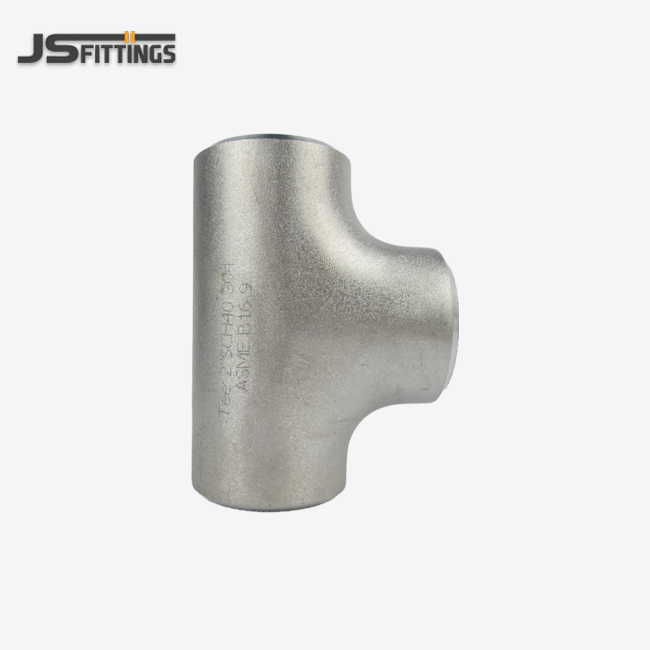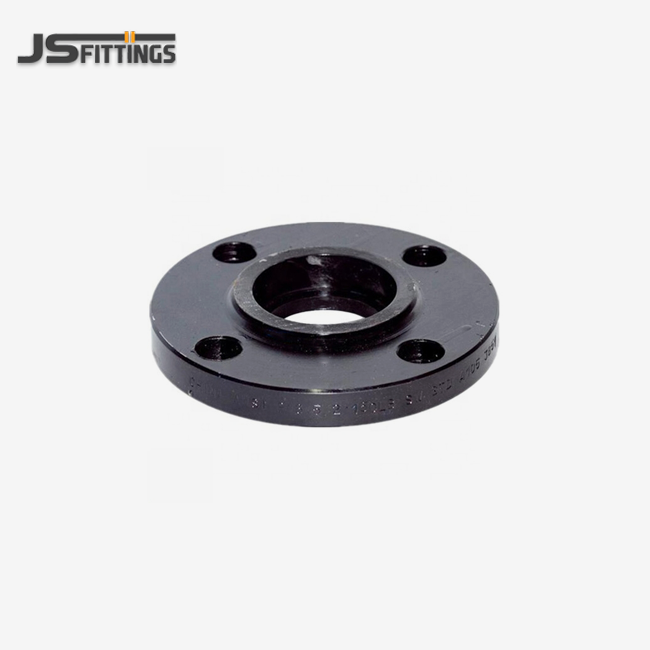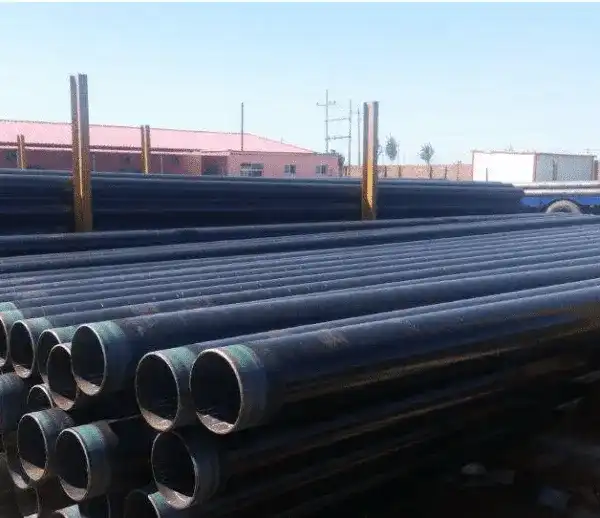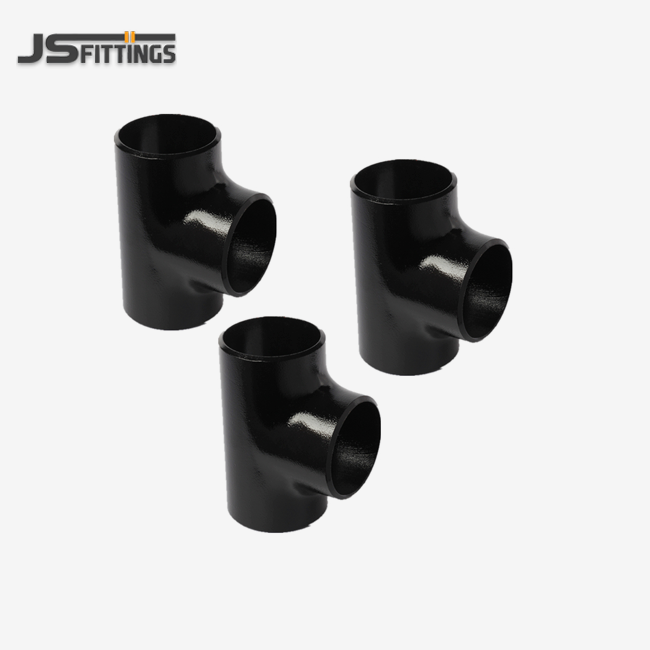The 2025 landscape for Carbon Steel Fittings and Flanges presents exceptional opportunities for industrial procurement professionals seeking reliable, cost-effective solutions. As global infrastructure projects expand and industries modernize their pipeline systems, selecting the right carbon steel components becomes critical for project success. These versatile pipe fittings offer outstanding mechanical properties, proven durability, and compliance with international standards like ASTM and ANSI specifications. Whether you're managing large-scale industrial piping installations or maintaining existing pressure vessel systems, understanding the best carbon steel options available ensures optimal performance and long-term value for your investment.
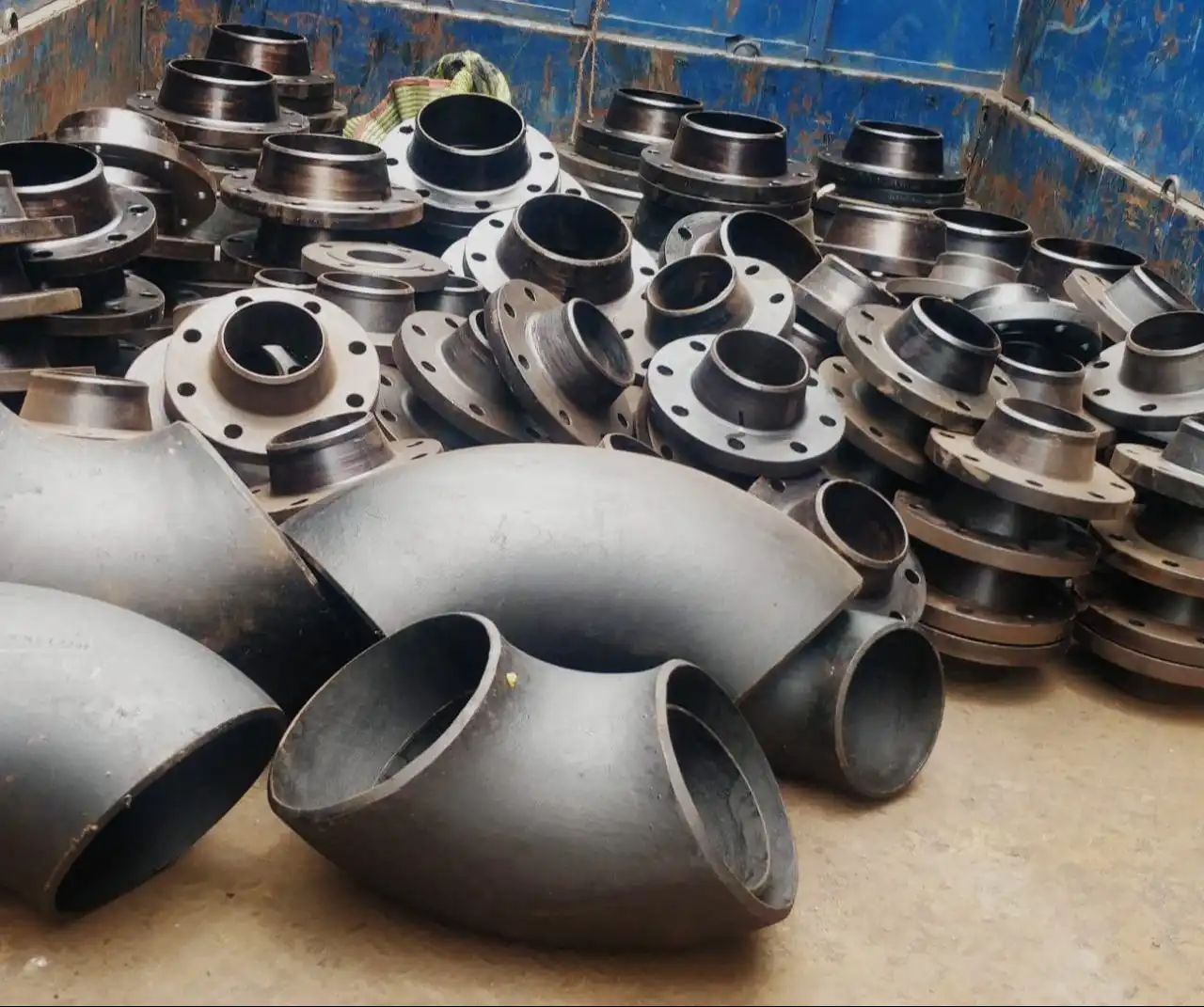
Why Carbon Steel Components Matter in Industrial Applications?
Industrial piping systems form the backbone of modern manufacturing, energy, and infrastructure projects worldwide. Carbon steel fittings and flanges deliver exceptional performance across diverse applications, from oil refineries to chemical processing plants. Their superior strength-to-weight ratio makes them ideal for high-pressure environments, while their cost-effectiveness appeals to budget-conscious project managers.
The versatility of carbon steel components extends beyond basic functionality. These materials withstand extreme temperatures and pressures that would compromise alternative materials. Their welding compatibility ensures seamless integration with existing pipeline systems, reducing installation complexity and labor costs. Additionally, carbon steel's proven track record in industrial applications provides confidence for long-term operational reliability.
Selection Criteria for Premium Carbon Steel Components
Choosing the best Carbon Steel Fittings and Flanges requires careful evaluation of multiple factors that directly impact project outcomes. Material grade selection forms the foundation of component performance, with different steel grades offering varying levels of strength, corrosion resistance, and temperature tolerance. Manufacturing quality determines dimensional accuracy and surface finish, affecting both installation ease and long-term performance.
Certification compliance ensures components meet international standards and regulatory requirements. Key certifications include ISO 9001 quality management systems, ASTM material specifications, and regional approvals like CE marking or GOST-R certification. Testing documentation provides verification of mechanical properties, chemical composition, and pressure ratings.
Supplier reliability plays a crucial role in project success. Established manufacturers with proven delivery records minimize supply chain risks and ensure consistent quality. Technical support capabilities help resolve installation challenges and provide ongoing assistance throughout the project lifecycle.
Premium Butt Weld Elbows for Seamless Pipeline Integration
Butt weld elbows represent essential components for directional changes in industrial piping systems. These seamless fittings provide smooth flow transitions while maintaining system pressure integrity. Manufacturing precision ensures perfect dimensional conformity with pipe specifications, eliminating fit-up issues during installation.
Key advantages include:
- Superior flow characteristics compared to threaded alternatives
- Enhanced structural integrity through continuous weld seams
- Reduced turbulence and pressure drop across connections
- Compatibility with automated welding processes
- Available in various angles including 45°, 90°, and 180° configurations
- Pressure ratings up to ANSI Class 2500
These components excel in high-pressure applications where system reliability cannot be compromised. Their seamless construction eliminates potential leak points associated with mechanical joints. The welded connection creates a permanent, maintenance-free solution that reduces long-term operational costs. Material traceability ensures quality control throughout the supply chain, providing documentation required for critical applications.
Installation flexibility allows these elbows to accommodate thermal expansion and contraction in pipeline systems. Their robust construction withstands vibration and mechanical stress common in industrial environments. Quality manufacturers provide comprehensive testing documentation including hydrostatic pressure testing and dimensional verification reports.
Heavy-Duty Reducing Tees for Complex Piping Networks
Reducing tees facilitate branch connections while accommodating different pipe sizes within the same fitting. These versatile components eliminate the need for separate reducers and tees, simplifying installation and reducing potential leak points. Their precision manufacturing ensures consistent wall thickness and smooth internal surfaces.
Notable benefits include:
- Space-efficient design for compact installations
- Reduced material costs through component consolidation
- Simplified inventory management
- Enhanced flow distribution characteristics
- Available in equal and unequal configurations
- Comprehensive size range from 1/2" to 48" nominal diameter
The manufacturing process involves hot forming techniques that maintain grain structure integrity throughout the fitting. This approach ensures uniform mechanical properties and eliminates weak points that could compromise system performance. Advanced quality control procedures verify dimensional accuracy and surface finish quality.
These fittings accommodate complex piping layouts common in process industries. Their ability to handle multiple pipe sizes reduces fitting inventory requirements and simplifies procurement processes. The seamless construction provides excellent resistance to fatigue loading, making them suitable for applications with cyclic pressure variations.
Carbon Steel Fittings and Flanges complement these reducing tees by providing durable and reliable connections in heavy-duty systems. Made from high-quality carbon steel, they offer superior strength and resistance to corrosion, ensuring long-lasting performance in harsh environments. Together with reducing tees, they form a comprehensive solution for building robust, efficient piping systems.
High-Pressure Welded Flanges for Critical Connections
Welded flanges provide permanent, high-strength connections for critical pipeline applications. These components offer superior performance compared to slip-on alternatives, particularly in high-pressure and high-temperature environments. Their welded construction creates a continuous metal path that enhances system integrity.
Primary advantages encompass:
- Maximum strength and reliability for demanding applications
- Excellent resistance to thermal cycling
- Minimal face runout for optimal gasket sealing
- Suitable for pressure vessels and high-stress applications
- Available in raised face, flat face, and RTJ configurations
- Pressure ratings from ANSI Class 150 to Class 2500
Manufacturing involves precision machining of flange faces to ensure proper gasket seating and leak-free operation. Material selection focuses on grades that provide optimal weldability while maintaining mechanical strength requirements. Heat treatment procedures optimize grain structure and relieve residual stresses from welding operations.
These flanges undergo rigorous testing including hydrostatic pressure testing, dimensional verification, and surface finish inspection. Traceability documentation tracks material from steel mill to final delivery, ensuring complete quality assurance. Their robust design accommodates bolt-up stresses and external loading without compromising seal integrity.
Precision-Engineered Pipe Caps for System Termination
Pipe caps provide permanent closure solutions for pipeline terminations and future expansion points. These components must withstand full system pressure while providing reliable long-term sealing. Manufacturing precision ensures proper fit-up with standard pipe dimensions and welding procedures.
Key features include:
- Seamless construction for maximum reliability
- Smooth internal surface finish
- Precise dimensional control for consistent fit-up
- Available in standard and heavy wall thicknesses
- Comprehensive size range for various applications
- Material certification for critical service applications
The manufacturing process utilizes hot forming techniques that maintain material properties throughout the component. Quality control procedures verify wall thickness uniformity and dimensional accuracy. Surface preparation meets requirements for various coating systems when corrosion protection is required.
These caps accommodate both temporary and permanent installation requirements. Their welded connection provides superior reliability compared to threaded alternatives. The seamless design eliminates crevices that could harbor corrosive substances or contaminants in sensitive applications.
Versatile Socket Weld Fittings for Small-Bore Applications
Socket weld fittings excel in small-bore piping applications where full penetration welding may not be practical. These components provide strong, reliable connections while simplifying installation procedures. Their design accommodates thermal expansion and provides excellent resistance to vibration-induced fatigue.
Significant advantages include:
- Simplified welding procedures reducing installation time
- Excellent fit-up characteristics
- Strong mechanical connection suitable for high-pressure service
- Reduced heat input during welding operations
- Available in complete range of configurations
- Cost-effective solution for instrumentation and small-bore piping
Manufacturing involves precision boring of socket dimensions to ensure proper pipe fit and gap control. The fillet weld design provides adequate strength while minimizing welding complexity. Quality control procedures verify socket dimensions and ensure proper edge preparation for welding operations.
These fittings accommodate applications where space constraints limit access for full butt weld procedures. Their compact design suits instrumentation and utility piping installations. The socket design provides positive pipe positioning during welding, ensuring consistent joint quality across multiple installations.
Industrial-Grade Pipe Reducers for Flow Management
Pipe reducers facilitate smooth transitions between different pipe sizes while maintaining optimal flow characteristics. These components minimize turbulence and pressure drop across size changes, improving overall system efficiency. Precision manufacturing ensures consistent wall thickness and smooth internal contours.
Core benefits encompass:
- Optimized flow transition geometry
- Reduced pressure drop compared to abrupt size changes
- Available in concentric and eccentric configurations
- Seamless construction for maximum reliability
- Wide range of size combinations
- Suitable for high-pressure and high-temperature applications
The forming process maintains consistent wall thickness throughout the transition, eliminating thin areas that could compromise pressure capability. Advanced manufacturing techniques ensure smooth internal surfaces that minimize flow disturbance. Quality control procedures verify dimensional accuracy and wall thickness uniformity.
These reducers accommodate both horizontal and vertical installations depending on configuration selection. Their seamless design provides excellent resistance to erosion and corrosion in demanding service conditions. Material selection focuses on grades that provide optimal combination of strength, weldability, and service performance.
Carbon Steel Fittings and Flanges complement these pipe reducers by offering robust, high-performance connections in industrial systems. Made from durable carbon steel, they provide exceptional strength and corrosion resistance, ensuring reliable performance in challenging environments. Together with pipe reducers, these components create a comprehensive solution for efficient and durable flow management across a wide range of industrial applications.
Regional Market Characteristics and Considerations
Latin American markets emphasize cost-effectiveness and reliable supply chains due to geographic challenges and economic considerations. Local distribution networks play crucial roles in project success, making supplier relationships essential. Certification requirements vary by country, with many following international standards while maintaining local approval processes.
Canadian markets prioritize safety compliance and environmental considerations. Extreme weather conditions demand components capable of withstanding temperature variations and thermal cycling. Regulatory frameworks emphasize worker safety and environmental protection, influencing material selection and installation procedures.
African markets focus on durability and long-term performance due to limited maintenance infrastructure. Component reliability becomes critical where replacement parts may be difficult to source. Local content requirements in some regions influence supplier selection and project planning.
Southeast Asian markets balance performance requirements with cost considerations. Rapid industrial development creates demand for reliable components that can support continuous operation. Tropical environments require consideration of corrosion resistance and humidity effects on material performance.
Central Asian and CIS countries often specify GOST standards alongside international specifications. Established supply relationships and proven performance records carry significant weight in supplier selection. Cold climate conditions influence material requirements and installation procedures.
Middle Eastern markets emphasize high-temperature performance and corrosion resistance due to harsh environmental conditions. Oil and gas industry influence drives demand for premium-grade components with comprehensive testing documentation. Project scale often justifies investment in higher-quality materials for improved long-term performance.
Purchasing Recommendations and Strategic Considerations
Successful procurement strategies begin with comprehensive specification development that addresses both immediate and long-term requirements. Material grade selection should consider operating conditions, corrosion environment, and mechanical loading. Pressure ratings must accommodate system design conditions with appropriate safety margins.
Supplier evaluation should encompass manufacturing capabilities, quality systems, and delivery performance. Site visits and capability assessments provide insight into production processes and quality control procedures. Reference projects and customer testimonials offer valuable perspectives on supplier reliability and support capabilities.
Testing and inspection requirements should align with project criticality and regulatory compliance needs. Standard tests include dimensional verification, hydrostatic pressure testing, and material certification. Additional testing may include non-destructive examination, hardness testing, and chemical analysis verification.
Delivery scheduling must accommodate manufacturing lead times and transportation requirements. International projects require consideration of customs clearance and local logistics capabilities. Inventory management strategies should balance carrying costs with supply security for critical components.
Technical support availability throughout the project lifecycle provides valuable assistance for installation challenges and operational questions. Training programs for installation personnel ensure proper handling and installation procedures. Documentation requirements should include material certificates, test reports, and installation guidelines.
Conclusion
Selecting the best carbon steel fittings and flanges for 2025 requires careful consideration of material properties, manufacturing quality, and supplier capabilities. The six product categories discussed represent proven solutions for diverse industrial applications, each offering specific advantages for different operational requirements. Market characteristics across target regions influence purchasing decisions and supplier selection criteria.
Successful procurement strategies emphasize long-term value over initial cost considerations. Quality components from established manufacturers minimize project risks and operational disruptions. Comprehensive technical support and reliable delivery performance contribute significantly to project success across international markets.
FAQ
Q1: What pressure ratings are available for carbon steel fittings and flanges?
A: Carbon steel fittings and flanges are available in pressure ratings from ANSI Class 150 (285 PSI) up to Class 2500 (6170 PSI) at room temperature. Higher pressure ratings require thicker walls and premium materials. Selection depends on system design pressure with appropriate safety factors.
Q2: How do socket weld fittings compare to butt weld alternatives?
A: Socket weld fittings provide simpler installation for small-bore applications but have lower pressure capabilities than butt weld alternatives. They're ideal for sizes 2 inches and smaller where full penetration welding may be impractical. Butt weld fittings offer superior strength for high-pressure applications.
Q3: What certifications should I require for carbon steel components?
A: Essential certifications include ISO 9001 quality management, ASTM material specifications, and regional approvals like CE marking or GOST-R certification. Material test certificates, dimensional inspection reports, and hydrostatic pressure test documentation provide additional quality assurance for critical applications.
Partner with JS FITTINGS for Your Carbon Steel Fitting Requirements
Industrial success depends on reliable partnerships with experienced carbon steel fittings and flanges manufacturers who understand your unique challenges. JS FITTINGS brings over four decades of manufacturing excellence to support your most demanding projects. Our advanced production capabilities and comprehensive quality certifications ensure consistent delivery of premium components that meet international standards.
Our expertise spans the complete range of butt-weld pipe fittings, welded flanges, and specialized components for industrial applications. ISO 9001, CE, and GOST-R certifications demonstrate our commitment to quality excellence and regulatory compliance. Four advanced production lines enable flexible scheduling and reliable delivery performance for projects of any scale.
Whether you're developing infrastructure projects in emerging markets or maintaining existing industrial facilities, our technical team provides comprehensive support throughout your project lifecycle. We understand the unique requirements of EPC contractors, distributors, and industrial end-users across Latin America, Canada, Africa, Southeast Asia, Central Asia, CIS countries, and the Middle East.
Transform your next project with proven carbon steel solutions that deliver outstanding performance and value. Our competitive pricing and consistent quality help minimize project risks while ensuring compliance with demanding specifications. Contact us at admin@jsfittings.com to discuss your specific requirements and discover how our expertise can contribute to your project success.
References
1. American Society of Mechanical Engineers. "ASME B16.9 Factory-Made Wrought Butt-welding Fittings." New York: ASME International, 2018.
2. ASTM International. "ASTM A234 Standard Specification for Piping Fittings of Wrought Carbon Steel and Alloy Steel for Moderate and High Temperature Service." West Conshohocken: ASTM International, 2019.
3. American National Standards Institute. "ANSI B16.5 Pipe Flanges and Flanged Fittings: NPS 1/2 through NPS 24 Metric/Inch Standard." Washington: ANSI, 2020.
4. International Organization for Standardization. "ISO 3183 Petroleum and Natural Gas Industries - Steel Pipe for Pipeline Transportation Systems." Geneva: ISO, 2019.
5. American Petroleum Institute. "API 5L Specification for Line Pipe." Washington: API Publishing Services, 2018.
6. NACE International. "NACE MR0175/ISO 15156 Petroleum and Natural Gas Industries - Materials for Use in H2S-Containing Environments in Oil and Gas Production." Houston: NACE International, 2017.
